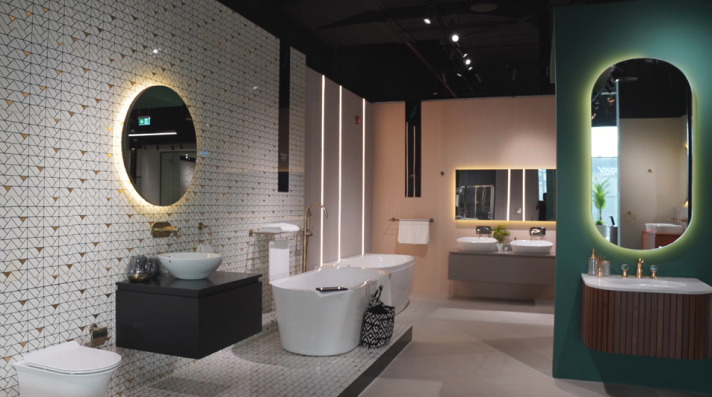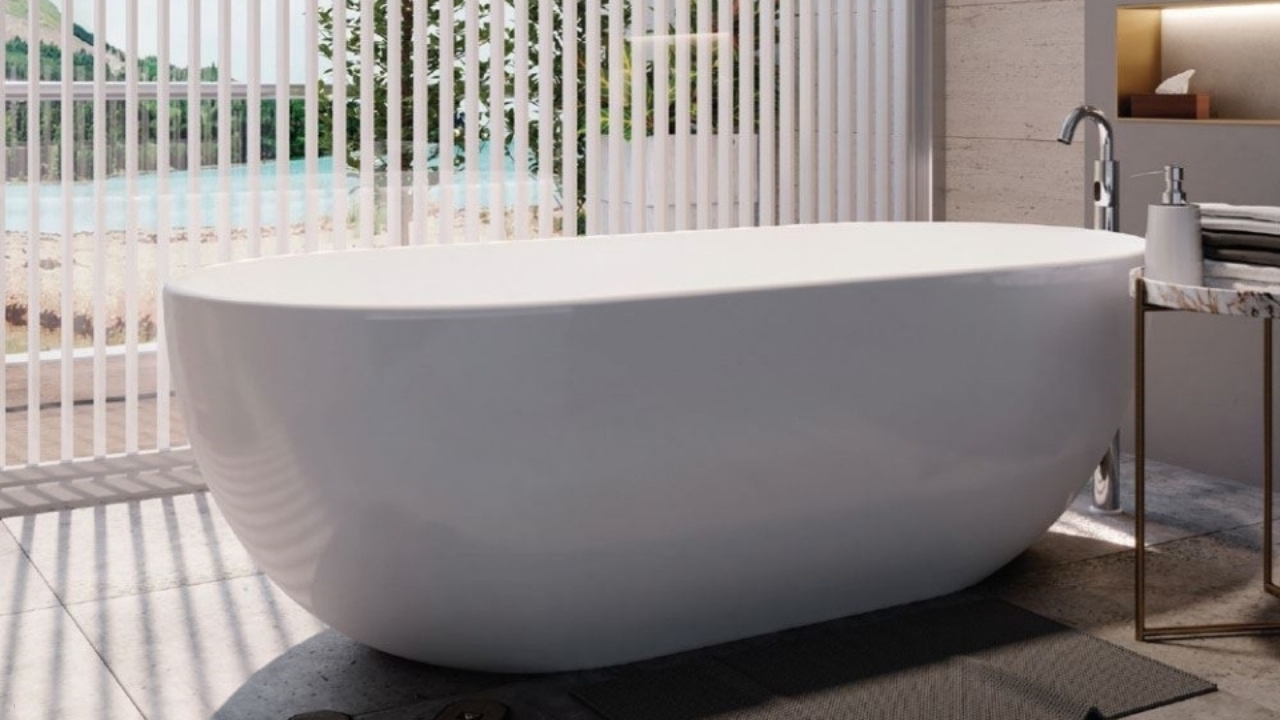Baths come in a myriad of styles, sizes and materials that will go with any bathroom decor. Even though cast iron, enameled steel, and acrylic remain popular choices when it comes to bathtubs, the resin tubs offer a highly durable, environmentally friendly and visually appealing modern option. Besides solid surface tubs other names for them are resin. They can be described as seamless with strength and versatility.
Resins can be natural or synthetic resins mixed with acrylics or minerals which combine to form composite materials called resin. This way, these kinds of tubs are able to take on any shape without chipping, scratching or staining. From contemporary oval tubs to vintage clawfoot models, they provide refined style. Therefore we shall look at seven crucial reasons why resin is an extraordinary choice for making bathtubs that has outshined the others in materializing into fabulous modern options.
What Are Resin Bathtubs?

Credits: Jaquar
Polyester, acrylic, epoxy, crushed minerals or stone particles make up the composition of resin bathtubs. With this kind of combination it is possible to pour the tubs into almost any size and design imaginable then hand finish them. The molded resin material feels smooth and glossy like high-end materials such as granite or marble do.
Unlike porcelain enameled or acrylic tubs that have seams; there are no crevices thus forming a single continuous surface by resin bathtubs where mildew or dirt could accumulate in these places.While most resin tubs come reinforced with fiberglass for extra strength.The material used in making these type of bathtubs makes them more resistant to stains resulting from spills.The other types of tubes cannot prevent stains as easily as this one does.
The installation process for lightweight stone-like imitations such as those made out of pure resins is much easier compared to ones made from real stone. Besides that, the tubs retain heat quite well because of the composition used to make them. The modern resin tubs’ appearance is sleek and spa-like while the vintage clawfoot resin ones carry a very old-fashioned look.
Benefits of Resin Bathtubs for Modern Homes

Credits: Jaquar
Modern Aesthetic Appeal
With their smooth, crisp lines and lustrous finish, resin bathtubs exude understated elegance perfect for contemporary homes. The composition can be tinted in today's trendy hues like gray, black, cream, or glossy white. Neutral resin bathtubs blend seamlessly into minimalist bathrooms.
Unique resin textures like a stone, pebble, or glitter swirl finish up the modern style factor. For a touch of nature, tubs can incorporate real bark, leaves, ferns, or seashells. The material captures fine detail for styles ranging from Japanese soaking tubs to antique rolls and scrolls.
Durability and Strength
Resin's seamless construction and tough material make these bathtubs highly durable and resistant to damage. The solid composite does not chip, peel, crack, or dent like porcelain enamel and many plastics. Resin retains its like-new luster for years with proper cleaning.
Most resin tubs come reinforced with a fiberglass backing for added strength. The material withstands harsh cleaners, UV light, humidity, and temperature fluctuations that degrade other tub materials. With care, resin tubs easily last 15-20 years, outperforming acrylic.
Lightweight and Easy Installation

Credits: Canva
Unlike cast iron and stone bathtubs, resin tubs weigh far less, averaging 100-200 pounds. The lightweight tubs prove much easier to maneuver into bathrooms and require less structural support. Some resin tubs come in two pieces for tight spaces.
For DIYers, the lighter weight provides an easier install option compared to 500-pound cast iron tubs that demand reinforced floors. With integrated feet or pedestals, resin freestanding tubs require minimal plumbing. The simple installation expands placement options.
Heat Retention
Resin's non-porous composition allows it to retain heat well for longer, warmer soaks. The material warms up quickly and maintains bathwater temperature better than enamel, acrylic, or metal. Resin's insulating qualities can save energy and cut down on reheating bath water.
Many companies also offer heated resin bathtubs with integrated heating systems to keep the tub surface toasty. The tub technology maintains warmth and mimics the soothing sensation of soaking in an all-natural wooden tub.
Low Maintenance

Credits: Canva
Resin tubs simply require regular gentle cleaning with soap and water to maintain their pristine look. The material resists staining and buildup of soap scum, mildew, and minerals that can plague other tub finishes.
For deeper cleaning, resin tolerates stronger bathroom cleaners and scrubbing better than other finishes. Avoid abrasive pads or scrubbers that could potentially dull the lustrous resin surface over time. Overall, resin tubs prove lower maintenance than most other tub materials.
Eco-Friendly and Sustainable

Credits: Canva
Another advantage of resin bathtubs is their favorable eco-profile compared to materials like acrylics, plastics, and enameled steel. Most resin is composed primarily of rapidly renewable polyester resins derived from plants. Some companies even use recycled resin.
Resin tubs produce significantly fewer carbon emissions during manufacturing compared to cast iron or steel. The lightweight tubs also conserve fuel and energy during shipping. Overall, resin offers a more sustainable modern bathtub choice for eco-conscious homeowners.
Versatility in Design
Resin lends itself beautifully to any bathtub silhouette imaginable from vintage clawfoot tubs to curvaceous modern sculptures. Seamless resin easily forms the smooth curves, rounded edges, and ornate detailing found in antique-inspired tubs.
For contemporary bathrooms, resin delivers sleek built-in tubs, exotic ovals, or Zen-like wooden Japanese soaking tubs. Any custom tub size or shape can be formed from resin. The material offers almost endless possibilities to complement your existing decor or create a unique focal point.
Resin Bathtubs for Both Aesthetic and Practical Benefits

Credits: Jaquar
With their inviting looks and practical durability, resin tubs bring the best of both worlds to modern bathroom design. The lustrous material excels at capturing any unique tub shape with elegant details and textures integrated flawlessly. Durable resin construction promises long-lasting splendor and indulgent soaks.
For contemporary styles, glossy white, black, or gray resin built-ins make stunning statements. Look for eco-friendly resin composition with reinforced fiberglass backing that retains heat well and resists damage. Measure carefully as resin tubs allow more integrated dimensions versus cast iron.
While resin bathtubs command premium pricing, their longevity provides lasting value. With routine maintenance, resin tubs easily provide 15-20 years of service life. Thanks to easy installation, a DIY upgrade is possible. Bring modern aesthetics and practicality to your bathroom with a sleek new resin bathtub.
Conclusion
With benefits ranging from eye-catching looks to serious durability, resin clearly outpaces other bathtub materials as a fantastic modern choice. The strong yet lightweight composite allows for gorgeous detailing alongside a polished high-end appearance that resin captures impeccably.
Few other materials offer resin's combination of strength, heat retention, stain resistance, and design flexibility. Resin tubs resist damage, retain heat, clean up easily, and mold seamlessly into any size and style. Their eco-friendly composition also appeals to sustainability-minded homeowners.
For today's bathrooms, resin bathtubs strike an ideal balance between sophisticated contemporary style, indulgent soaking comfort, and durable low-maintenance practicality. With proper care, resin tubs create a beautiful, functional centerpiece that promises to elevate your bathing rituals for years to come.
FAQs
Q: How do resin bathtubs compare in terms of durability to acrylic or cast iron?
- Resin is more durable than acrylic and less prone to scratches as compared to cast iron. With good maintenance care, most resin tubs can last for 15-20 years.
Q: Are resin bathtubs good at retaining heat when soaking?
- Yes; this material can keep heat efficiently so that bathwater remains hotter for a longer time compared with metal or acrylic tubs. Some models have built-in heaters for the tub.
Q: Can you use abrasive cleaners on a resin bathtub?
- Avoid harsh cleaning agents and abrasive pads/scrubbers that might eventually make the shiny resin finish appear duller. Use mild soap and water only.
Q: Do resin bathtubs have environmental benefits?
- Most of these involve rapidly renewable plant-based polyester resins that release significantly lower emissions during its manufacturing unlike metal or acrylic ones.
Q: What are some disadvantages of using a resin bathtub?
- The main downsides include high costs as compared to other materials like acrylic or enameled tubs and ensuring that harsh cleaning agents don’t dull their shiny appearance over time.
Q: How heavy are they versus cast iron?
- Resin tubs usually weigh about 100-200 pounds on average while many cast iron ones end up weighing more than half-a-tonne (500 lbs). This makes installation easier too.
Q: Can I install it on the second floor instead of ground floor or above my basement rather than in it?
- Yes – because it weighs much less than cast iron does, resin can be installed on upper levels or over basements where cast iron would not be feasible due to structural support weight limits.
Concluding Thoughts
Contemporary designs and well-built construction joined together resin as the voice of aesthetics for modern bathrooms. Resin can mold into any shape yet it is impervious. The resilience of this material coupled with its ease of maintenance combines functionality and style in one package. Think about a resin bathtub that sets you apart from others, and will leave your guests in awe after they have taken a bath.


